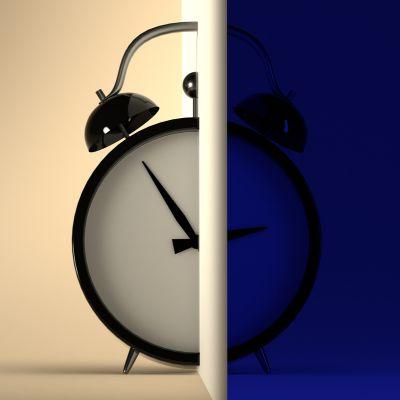Understanding Circadian Rhythm and Sleep

As we know, Sleep is one of the most fundamental aspects of human health, yet many people struggle with getting quality rest. For athletes and those in training, proper sleep is essential for muscle recovery, performance, and overall well-being.
One of the most critical factors influencing sleep is the circadian rhythm - our internal biological clock that regulates our sleep-wake cycle. Understanding how this rhythm works and what affects it can help improve sleep quality, boost energy levels, performance and enhance overall well-being.
What Is the Circadian Rhythm?
The circadian rhythm is a 24-hour cycle that influences various physiological processes, including sleep, metabolism, and hormone production. This internal clock is primarily regulated by the suprachiasmatic nucleus (SCN) in the hypothalamus, which responds to light and darkness.
- In the morning, exposure to natural light signals the SCN to reduce melatonin (the hormone that promotes sleep) and increase cortisol, helping us feel alert and ready for the day.
- As evening approaches and light exposure decreases, melatonin production increases, preparing the body for rest.
How Circadian Rhythms Affect Sleep
Your circadian rhythm determines when you feel awake and when you feel sleepy. A stable rhythm ensures you fall asleep and wake up at consistent times, while disruptions can lead to sleep disturbances like insomnia, poor sleep quality and daytime fatigue.
For athletes and those in training, an imbalanced circadian rhythm can negatively impact recovery, performance, and energy levels, making sleep regulation crucial for optimal results.
Factors That Disrupt Circadian Rhythms
Several factors can interfere with our circadian rhythm, including:
Artificial Light Exposure – The widespread use of electronic devices emitting blue light can suppress melatonin production and delay sleep onset.
Irregular Sleep Patterns – Inconsistent bedtimes and wake-up times (e.g., shift work or social jet lag) can disrupt the natural cycle.
Jet Lag – Traveling across time zones confuses the body’s internal clock, leading to temporary circadian misalignment.
Caffeine and Stimulants – Consuming caffeine, nicotine, energy drinks, or pre-workout supplements late in the day can interfere with sleep by increasing alertness and delaying the onset of sleep.
Lack of Natural Light – Spending too much time indoors without exposure to natural sunlight can weaken circadian signals.
Stress and Anxiety – High levels of stress can alter cortisol rhythms, making it harder to relax and fall asleep.
How to Optimise Your Circadian Rhythm for Better Sleep
Regulating your circadian rhythm can significantly improve your sleep quality. Here are some science-backed strategies to keep your internal clock in sync:
1. Prioritise Natural Light Exposure
Natural light exposure in the morning helps regulate the circadian rhythm by reinforcing wakefulness signals. Aim to spend at least 30 minutes outdoors within the first hour of waking up. If this isn’t possible, consider a light therapy lamp to mimic natural daylight.
2. Maintain a Consistent Sleep Schedule
Going to bed and waking up at the same time every day, including weekends, reinforces the circadian rhythm. Avoid drastic changes in sleep patterns, as even a one-hour shift can cause disruptions.
3. Limit Blue Light Exposure in the Evening
Since blue light suppresses melatonin production, reduce screen time at least 1-2 hours before bed. Use blue light-blocking glasses or enable night mode on devices to minimize exposure.
4. Create a Relaxing Nighttime Routine
Engaging in relaxing activities before bed, such as reading, meditation, or gentle stretching, helps signal the body that it’s time to wind down. Avoid engaging in stimulating activities like watching intense TV shows or working late at night.
5. Optimize Your Sleep Environment
A sleep-friendly environment enhances rest. Keep your bedroom:
Dark: Use blackout curtains or an eye mask.
Quiet: Use white noise machines or earplugs if necessary.
Cool: Maintain a temperature between 60-67°F (15-19°C).
6. Monitor Your Caffeine and Alcohol Intake
Caffeine has a long half-life and can stay in your system for up to 6 hours. Avoid consuming it in the afternoon or evening. Alcohol, while initially sedative, can disrupt deep sleep later in the night, so moderate consumption is advised.
7. Stay Active During the Day
Regular physical activity supports a healthy circadian rhythm, but intense exercise should be avoided close to bedtime, as it can elevate cortisol levels and delay sleep onset.
8. Timing of Meals
Food timing regulates the circadian rhythm by influencing the body's metabolic processes and hormone rhythms.
The Link Between Circadian Rhythm and Overall Health for Athletes and Training
A well-regulated circadian rhythm is essential not just for sleep, but for the overall health and performance of both athletes and individuals training. It influences various aspects of physical and mental well-being, including:
• Metabolism and Weight Management: Disruptions to the circadian rhythm can affect metabolic processes, making it harder to regulate energy levels and maintain optimal body composition for both athletes and those training.
• Mental Health: A well-aligned circadian rhythm supports emotional balance, resilience, and mental clarity. For athletes and individuals in training, disruptions can contribute to heightened stress, anxiety, and mood instability, which can affect motivation, focus, and overall performance.
• Immune Function: Poor sleep, often caused by circadian misalignment, can weaken immune defences, increasing susceptibility to illness and injury.
• Cognitive Function: Focus, memory, and decision-making are all influenced by circadian health. When the rhythm is disrupted, cognitive performance declines, impacting both training and recovery.
Your circadian rhythm is the foundation of sleep health and keeping it in balance leads to more restful nights, better energy levels, and improved overall well-being. By prioritising light exposure, maintaining a consistent schedule, and adopting sleep-friendly habits, you can optimise your internal clock and support better recovery, performance, and long-term health.
Understanding and respecting your body’s natural rhythms is one of the most powerful ways to enhance sleep, energy, and overall vitality—whether you're an athlete, in training, or simply looking to improve your well-being.
FREE RESOURCE


